牛津高中英语模块七 unit1 语法
新牛津高中英语模块七第一单元知识点整理及单元试

新牛津高中英语模块七第一单元知识点整理及单元试————————————————————————————————作者:————————————————————————————————日期:新牛津高中英语模块七第一单元知识点整理及单元练习M7 UNIT1一、词汇大集合【单词】1. It is still uncertain who invented TV. 至今还未能确定谁发明了电视。
uncertain adj. 不确定的;无把握的;是certain的反义词▲be uncertain about / of sth. 对…不确定/ 没把握They are both uncertain about what to do. 他们两人都拿不定主意该怎么办。
▲It’s uncertain + 主语从句It’s uncertain whether he will come tomorrow. 他明天不一定会来。
2. superior adj. 优秀的;上等的;有优越感的;无比较级 n. 上级;上司▲be superior to 优于;胜过His new computer is technically superior to mine. 他的新电脑在技术上超过了我的。
I’m going to complain to your superiors. 我要找你的上司投诉。
3. wind vt. 上发条;缠;绕; 摇;弯曲前进;迂回;蜿蜒(wound; wound)▲wind up 给…上发条He wound up the toy car and let it go. 他给玩具车上发条然后松手让它跑。
▲wind through 蜿蜒穿过The river winds through the woods. 那条河蜿蜒流过树林。
▲wind one’s way 蜿蜒向前;曲直延伸The Great Wall winds its way over mountains from the west to the east.4. apply vt. / vi. 应用;运用;申请;▲apply sth. to sth. 把…应用于…Scientific discoveries are often applied to industry. 科学发明常运用于工业。
牛津英语模块七知识点unit1
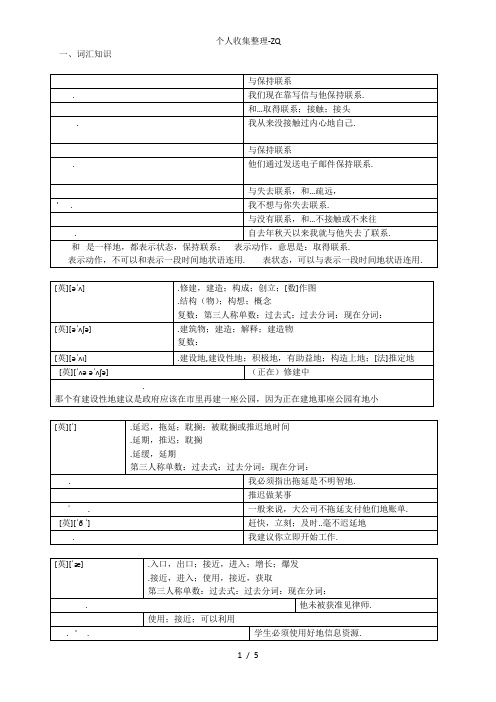
一、词汇知识
与与与地区别
地区别
一、英文解释
、, . 否认
、, . 拒绝给予
、, , . 拒绝
、, . 拒绝给予
、, , , . 拒绝; 不同意
、, . 摈弃
. , . 拒绝(录用或录取) , . 拒绝(某人地爱情)
, . 谢绝[]
二、含义区别及用法:
作“否定、否认”,当否认某件事时,就是否认它地真实性.其后可接名词、代词、动名词或从句.其次,结构,就是拒绝给予某人想要地东西.
:语气比强,含有非常坚决地、不客气地拒绝地意味.其后接接名词或代词、不定式,
后通常只接名词或代词,不能接动词不定式.语气比更强,“拒绝”、“驳回”,正式用词,强调不接受、不采纳他人地意见、建议、请求等.也可表示表示由于客观条件不符合规定地标准而遭到拒绝.
.婉言拒绝,谢绝,相当于,比较正式. ;
有位网友举了一个滑稽地例子,来区分这些词汇.
◆一个男孩邀请一个女孩吃烛光晚餐,女孩说“我今天已经有约会了”,这个男孩一定非常痛苦,问女孩“难道不能给我一个机会吗”,女孩说“其实你很好,但我不能跟你在一起”,这种拒绝就叫做“”.
◆但如果女孩说“我不跟你去,你以后不要再来找我了.”这种拒绝就是“”了.
◆那么什么叫“”呢?如果这个男孩送这个女孩一束鲜花,并邀请她吃烛光晚餐,这女孩接过鲜花“啪”。
牛津译林版,高考重点单词难点解析个人整理,高二模块七-unit1
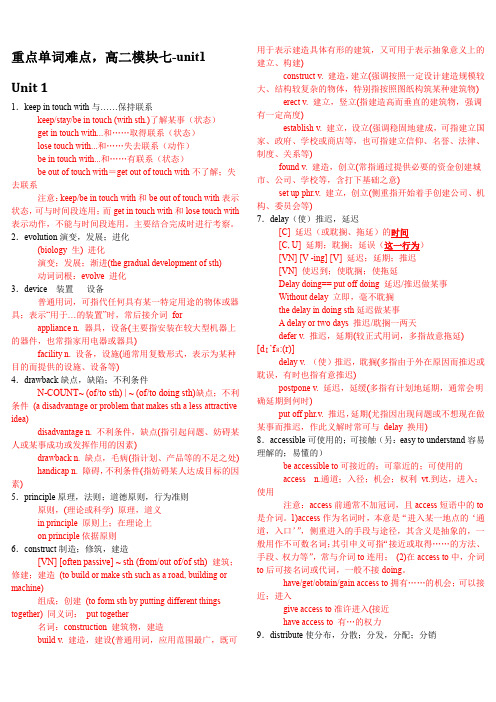
重点单词难点,高二模块七-unit1Unit 11.keep in touch with与……保持联系keep/stay/be in touch (with sth.)了解某事(状态)get in touch with...和……取得联系(状态)lose touch with...和……失去联系(动作)be in touch with...和……有联系(状态)be out of touch with=get out of touch with不了解;失去联系注意:keep/be in touch with和be out of touch with表示状态,可与时间段连用;而get in touch with和lose touch with 表示动作,不能与时间段连用。
主要结合完成时进行考察。
2.evolution演变,发展;进化(biology 生) 进化演变;发展;渐进(the gradual development of sth)动词词根:evolve 进化3.device 装置设备普通用词,可指代任何具有某一特定用途的物体或器具;表示“用于…的装置”时,常后接介词forappliance n. 器具,设备(主要指安装在较大型机器上的器件,也常指家用电器或器具)facility n. 设备,设施(通常用复数形式,表示为某种目的而提供的设施、设备等)4.drawback缺点,缺陷;不利条件N-COUNT~ (of/to sth) | ~ (of/to doing sth)缺点;不利条件(a disadvantage or problem that makes sth a less attractive idea)disadvantage n. 不利条件,缺点(指引起问题、妨碍某人或某事成功或发挥作用的因素)drawback n. 缺点,毛病(指计划、产品等的不足之处)handicap n. 障碍,不利条件(指妨碍某人达成目标的因素)5.principle原理,法则;道德原则,行为准则原则,(理论或科学) 原理,道义in principle 原则上;在理论上on principle依据原则6.construct制造;修筑,建造[VN] [often passive] ~ sth (from/out of/of sth) 建筑;修建;建造(to build or make sth such as a road, building or machine)组成;创建(to form sth by putting different things together) 同义词:put together名词:construction 建筑物,建造build v. 建造,建设(普通用词,应用范围最广,既可用于表示建造具体有形的建筑,又可用于表示抽象意义上的建立、构建)construct v. 建造,建立(强调按照一定设计建造规模较大、结构较复杂的物体,特别指按照图纸构筑某种建筑物) erect v. 建立,竖立(指建造高而垂直的建筑物,强调有一定高度)establish v. 建立,设立(强调稳固地建成,可指建立国家、政府、学校或商店等,也可指建立信仰、名誉、法律、制度、关系等)found v. 建造,创立(常指通过提供必要的资金创建城市、公司、学校等,含打下基础之意)set up phr.v. 建立,创立(侧重指开始着手创建公司、机构、委员会等)7.delay(使)推迟,延迟[C] 延迟(或耽搁、拖延)的时间[C, U] 延期;耽搁;延误(这一行为)[VN] [V -ing] [V] 延迟;延期;推迟[VN] 使迟到;使耽搁;使拖延Delay doing== put off doing 延迟/推迟做某事Without delay 立即,毫不耽搁the delay in doing sth延迟做某事A delay or two days 推迟/耽搁一两天defer v. 推迟,延期(较正式用词,多指故意拖延)[dɪ’fɜ:(r)]delay v. (使)推迟,耽搁(多指由于外在原因而推迟或耽误,有时也指有意推迟)postpone v. 延迟,延缓(多指有计划地延期,通常会明确延期到何时)put off phr.v. 推迟,延期(尤指因出现问题或不想现在做某事而推迟,作此义解时常可与delay 换用) 8.accessible可使用的;可接触(另:easy to understand容易理解的;易懂的)be accessible to可接近的;可靠近的;可使用的access n.通道;入径;机会;权利vt.到达,进入;使用注意:access前通常不加冠词,且access短语中的to 是介词。
牛津英语模块七第一单元所有知识点详解1
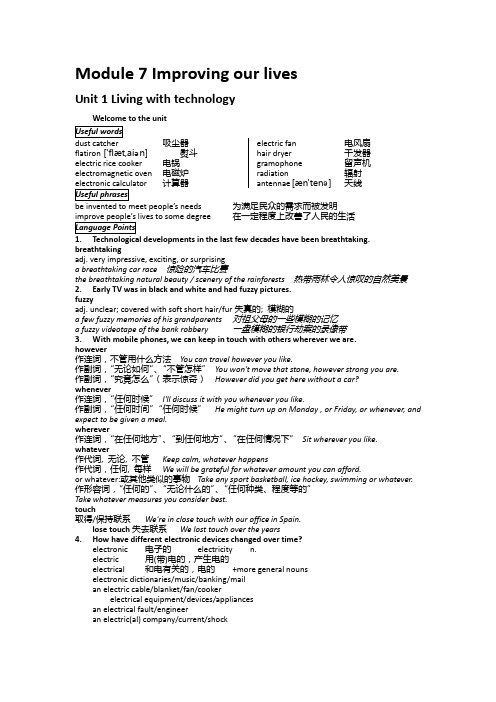
Module 7 Improving our lives Unit 1 Living with technologyWelcome to the unit吸尘器flatiron['flæt,aiәn]熨斗electric rice cooker 电锅electromagnetic oven 电磁炉计算器electric fan 电风扇hair dryer 干发器gramophone 留声机radiation辐射antennae [æn'tenə]天线为满足民众的需求而被发明在一定程度上改善了人民的生活breathtakingadj. very impressive, exciting, or surprisinga breathtaking car race 惊险的汽车比赛the breathtaking natural beauty / scenery of the rainforests 热带雨林令人惊叹的自然美景2.Early TV was in black and white and had fuzzy pictures.fuzzyadj. unclear; covered with soft short hair/fur失真的; 模糊的a few fuzzy memories of his grandparents 对祖父母的一些模糊的记忆a fuzzy videotape of the bank robbery 一盘模糊的银行劫案的录像带3.With mobile phones, we can keep in touch with others wherever we are.however作连词,不管用什么方法You can travel however you like.作副词,“无论如何”、“不管怎样”You won't move that stone, however strong you are.作副词,“究竟怎么”(表示惊奇)However did you get here without a car?whenever作连词,“任何时候”I'll discuss it with you whenever you like.作副词,“任何时间”“任何时候”He might turn up on Monday , or Friday, or whenever, and expect to be given a meal.wherever作连词,“在任何地方”、“到任何地方”、“在任何情况下”Sit wherever you like. whatever作代词, 无论, 不管Keep calm, whatever happens作代词,任何, 每样We will be grateful for whatever amount you can afford.or whatever:或其他类似的事物Take any sport basketball, ice hockey, swimming or whatever.作形容词,“任何的”、“无论什么的”、“任何种类、程度等的”Take whatever measures you consider best.touch取得/保持联系We're in close touch with our office in Spain.lose touch失去联系We lost touch over the years4.How have different electronic devices changed over time?electronic 电子的electricity n.electric 用(带)电的,产生电的electrical 和电有关的,电的+more general nounselectronic dictionaries/music/banking/mailan electric cable/blanket/fan/cookerelectrical equipment/devices/appliancesan electrical fault/engineeran electric(al) company/current/shockdid regular public TV broadcasting begin around the world? It began on 11 May 1928 in New York and in London on 20 Agugust 1929.It is the TV set combined with the World Wide Web. 3. What was invented in 1954? Event1877 First recording of a human voice was made1925 First public showings of wireless TV transmissions were made in the USA.1948 Cable TV began in the USA; 3 American scientists invented the transistor1951 Color broadcasts began in the USA.1954 Invention of transistor led to the development of cassette recorders1958 First LPs(long-play records) came onto the market1962 Satellite began to be used to broadcast TV.1982 First CDs produced by using digital technology were made available1987 Development of MP3 technology started in Germany1989 International standards for digital TV were established1992 Development of MD palyer began.considerbe of the opinion; regard sb/sth as sth 认为; 视某人[某事物]为:We consider that you are not to blame. 我们认为不该责怪你.* We consider this (to be) very important. 我们认为这非常重要.* Do you consider it wise to interfere? 你认为应该干预吗?* He will be considered a weak leader. 他会被认为是个软弱无能的领导人.* a painting previously considered as worthless, but which now turns out to be very valuable 一幅先前认为毫无价值的画, 现在却变成了珍品* He's generally considered to have the finest tenor voice in the country. 现在公认他是该国最佳的男高音歌手.* (formal) He's very well considered (if people have a high opinion of him) within the company. 他在公司中受到很高的评价.* Consider yourself (if You are) under arrest. 你已被逮捕.superiorn. 长者, 高手, 上级be superior to “比 ……好,比…..强”In my opinion, trousers made by hand are superior to those made by machines. 在我看来, 手工制作的裤子要比机器加工的好.Of the two books, I think this one is superior to that. 就这两本书而言, 我认为这本比那本更好.We will need a letter of recommendation from one of your superiors. 我们需要一封你们领导写的推荐信.immediate superiors 顶头上司superiority [sju:,pi әri'ɒriti] n. 优越, 高傲 [化] 优越性2. At that time, the record player had to be wound up by hand and only played a record fortwo minutes (page 3,line 31-32)wind to turn or twistThe nurse wound a bandage around my finger so that bleeding could be stopped.The little boy wound his arms around his mother’s waist and prevented her leaving.Remember to wind the clock every night before you go to bed if you do not want it to stop.3. This combines the TV set with the world Wide Web.(page 2, line 25)combine…with… to join something together withA good way of teaching children is to combine teaching with pleasure.Theory should be combined with practice.In water, two atoms of hydrogen are combined with an atom of oxygen.4.It all began in 1877 when Thomas Edison made the first recording of a human voice.(page3, lines 29-30)recording●[C] sound or pictures that have been recorded on tape, video, etc: a cassette / tape / videorecording ◆a hit recording on cassette and CD ◆a recording of English music for clarinet and orchestra●[U] the process of making a record, tape, film/movie, etc: during the recording of the show◆recording equipment / techniques ◆a recording session / studio●[U] the process or act of writing down and storing information for official purposes:therecording of financial transactionsmake a recording of录制5.They bought the patent and applied the technology to create the transistor radio.(page 3,lines39-40)apply to bring or put into use or operation运用, 应用某事物to apply economic sanctions / political pressure ◆The new technology was applied to farming. Scientific discoveries are often applied to industrial processes. 科学上的发明通常都应用于工业生产过程.make a formal request申请; 请求You should apply immediately, in person or by letter. 你应该立即申请, 亲自去也好, 写信也好. * apply to the publishers for permission to reprint an extract 向出版者请求准予转印节录* apply for a job, post, passport, visa 申请工作﹑职位﹑护照﹑签证.make (a law, etc) operate or become effective使(法律等)实施或生效apply a law/rule/precept 执行法律[规则/规程] * apply economic sanctions 施行经济制裁.6.In the following years, more CD recordings became available, and in 1988, for the firsttime ever, people were demanding more CDs than LPs.(page 3, lines 48-49)demand need, to need in order to be successful 需求(某事物); 需要demand+n/prnoun/to infinitive/object clauseThis sort of work demands great patience. 这种工作需要极大耐性.* Does the letter demand an immediate answer? = Must it be answered at once?The work of a teacher demands great care and patience.教师的工作需要极大的细心和耐心. demand ask for (sth) as if one is commanding, or as if one has a right to do so 要求, 请求(某事物)demand an apology (from sb) 要求(某人)道歉* The workers are demanding better pay. 工人要求提高工资.She demanded to speak to the manager. 她要求跟经理谈话.He demands that he (should) be told/demands to be told everything.他要求将一切都告诉他. demand (for sb to do sth); ~ (for sth/that...)command, or sth which is given as if it was a command 要求; 请求receive a tax demand 接到纳税通知It is impossible to satisfy all your demands. 满足你所有的要求是不可能的.There have been fresh demands for the Prime Minister to resign. 人们最近不断要求首相辞职. * demands for reform/that there should be reform 改革要求.supply and demand[经] 供应与需求7.Development of MP3 technology started in 1987 in Germany and since the beginning of1999, the popularity of MP3 has increased to such a degree that major corporations are taking over the portable music player market with MP3 players. (page 3, lines 53-56) degree [C, U] step or stage in a scale or series 程度; 等级She shows a high degree of skill in her work. 她在工作中表现出高度的技巧.He was not in the slightest degree interested, ie was completely uninterested. 他丝毫不感兴趣.●To what degree (= To what extent, How much) was he involved in the crimes?他在多大程度上参与了这些犯罪活动?The children have different degrees of ability. 孩子的能力高低各不相同.To what degree can they be trusted. 对他们能信任到什么程度.To what degree is she interested in films? 她对电影的兴趣都到了什么程度了?8.Because of the popularity of MP3 players, music websites have sprung up all over theInternet offering MP3 music for people to purchase.(page 3, lines 57-58)spring up appear, develop, grow, etc quickly or suddenly 迅速地或突然地出现﹑发展﹑生长等weeds springing up everywhere 很快长得到处都是的杂草A breeze sprang up as we were returning. 我们回来时突然起了一阵轻风.New houses were springing up all over the town. 全镇各处很快盖起了新房子.spring out of bedspring to one’s feet (=stand up suddenly)spring n. 春天;弹簧, 发条;泉9.Germany was the birthplace of MP3, not Japan or the USA as I had assumed they wouldbe.(page 5)assumeI didn't see your car,so I assumed you'd gone out.我没有看见你的汽车,所以以为你已经出去了Assuming that this painting is really a Van Gogh, how much do you think it’s worth?[VN] to give sb a lot of pleasure and enjoyment: This news will delight his fans all over the world. Phrasal Verbs: delight in sth / doing sth [no passive] to enjoy doing sth very much, especially sth that makes other people feel embarrassed, uncomfortable, etc.variety n[U] quality of not being the same, or not being the same at all timesoffer, show, lack variety 提供﹑显示出﹑缺乏多样化的事物* a life full of change and variety 丰富多彩的生活* We all need variety in our diet. 我们都需要饮食多样化.[sing] ~ (of sth) number or range of different things; assortment 若干不同的事物(的混合)He left for a variety of reasons. 他由於种种原因而离开了.* a large/wide variety of patterns to choose from 可供选择的种类繁多的花样.variety store (US) shop selling a wide range of small inexpensive items 杂货铺.1 work; operate 起作用; 运转: His brain seems to be functioning normally. 他的大脑看来功能正常. * This machine has stopped functioning= is out of order. 这机器坏了.We now have a functioning shower.2 ~ as sth work as sth; operate or perform the function of the thing specified 起某物的作用; 具有某物的功能; 起到所述事物的作用The sofa can also function as a bed. 这沙发也可以当床.Some English adverbs function as adjectives. 英语中有些副词可作形容词用.n. [U] control or instruction: 命令The project was under the direction of a well-known academic.[C] the position towards which someone or sth. moves or faces: 方向Tom went off in one direction and Harry in another. 汤姆朝一个方向走, 哈里则朝另一个方向* The aircraft was flying in a northerly direction. 飞机正在向北飞去.* The signpost points in a westerly direction. 路标指向西.[C,pl.] information or instructions about what to do, where to go, how to do sth, etc 指南; 指示;说明书; 用法说明; 操作说明:Simple directions for assembling the model are printed on the box. 盒上印有装配模型的简要说明.* I gave him full directions to enable him to find the house. 我向他作了详细说明, 好让他能找到那房子.[U] management; supervision; guidance 管理; 监督; 指导; 指点:He did the work under my direction. 他在我的指导下做这件事.* She was entrusted with the direction of the project. 她受委托负责这项计划.* He feels the need for firm direction = wants sb to guide and advise him.directions [pl] address on a letter, parcel, etc (信件﹑包裹等上的)姓名地址:The parcel was returned to the sender because the directions were incorrect. 包裹因姓名地址有误而退给了寄件人.2.anyhow(p8)= ANYWAY, whatever the facts may be; in spite of this; at least 无论如何; 即使如此; 至少It's too late now, anyhow. 无论如何现在已经太迟了. * Anyhow, you can try. 至少你可以试试. in a careless way; not arranged in an order:She piled the papers in a heap on her desk, just anyhow.The books were lying on the shelves just/all anyhow. 书都乱放在书架上.* He made notes anyhow across the page. 他在那页上胡乱作了些笔记.3.up to(p9)(a) as a maximum number or amount 作为最大数量; 多达:I can take up to four people in my car. 我的汽车最多能坐四个人.* count up to twenty slowly 慢慢数到二十.(b) (also up until sth) not further or later than sth; as far as sth 不多於; 不迟於; 直到:Read up to page 100. 读到第100页. * Up to now he's been quiet. 他直到此刻仍保持沉默.* Up until the war she had never lived alone. 她在战争爆发前从未独自生活过.(c) comparable with sth 可与某事物相比:It's not up to his usual standard. 这次没达到他平时的水平.(d) capable of sth 有某种能力的; 能胜任:He's not up to the part of Othello. 他演不了奥赛罗这个角色.* I don't feel up to going to work today. 我今天不舒服, 不能上班.(e) (infml 口) occupied or busy with sth 正在做着或忙於某事物:What's he up to? 他忙什麽呢?* He's up to no good, ie doing sth bad. 他现在没干好事.* What tricks has she been up to (=playing)? 她搞什麽鬼呢?并非你听到的每一件事情都同样重要此句为部分否定句,句意是.= Everything that you hear will not be equally important.在英语中all, both, every, everyone, everything 等与否定词not 连用时,表示的是部分否定,而非全部否定。
牛津英语模块七知识点unit1
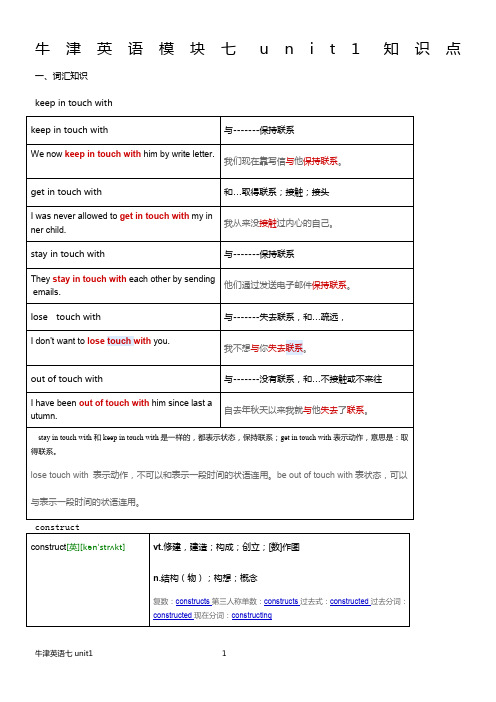
牛津英语模块七u n i t1知识点一、词汇知识keep in touch withdelayaccesshave sth.donewindobviousvoteopposecircumstancesacrificeridsuitablereject与refuse与decline与deny的区别①、When you deny something, you state that it is not true. 否认②、If you deny someone something that they need or want, you refuse to let them have it. 拒绝给予refuse①、If you refuse to do something, you deliberately do not do it, or you say firmly that you will not do it. 拒绝②、If someone refuses you something, they do not give it to you or do not allow you to have it. 拒绝给予reject①、V-T If you reject something such as a proposal, a request, or an offer, you do not accept it or you do not agree to it. 拒绝; 不同意②、V-T If you reject a belief or a political system, you refuse to believe in it or to live by its rules. 摈弃③. V-T If someone is rejected for a job or course of study, it is not offered to them. 拒绝(录用或录取) ④V-T If someone rejects another person who expects affection from them, they are cold and unfriendly toward them. 拒绝(某人的爱情)DeclineIf you decline something or decline to do something, you politely refuse to accept it or do it. 谢绝[FORMAL]二、含义区别及用法:Deny 作“否定、否认”,当否认某件事时,就是否认它的真实性。
牛津高中英语模块七unit1语法
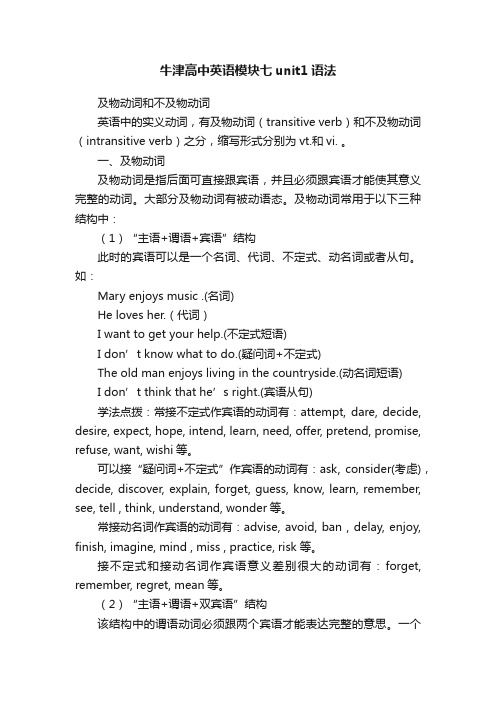
牛津高中英语模块七unit1语法及物动词和不及物动词英语中的实义动词,有及物动词(transitive verb)和不及物动词(intransitive verb)之分,缩写形式分别为vt.和vi. 。
一、及物动词及物动词是指后面可直接跟宾语,并且必须跟宾语才能使其意义完整的动词。
大部分及物动词有被动语态。
及物动词常用于以下三种结构中:(1)“主语+谓语+宾语”结构此时的宾语可以是一个名词、代词、不定式、动名词或者从句。
如:Mary enjoys music .(名词)He loves her.(代词)I want to get your help.(不定式短语)I don’t know what to do.(疑问词+不定式)The old man enjoys living in the countryside.(动名词短语)I don’t think that he’s right.(宾语从句)学法点拨:常接不定式作宾语的动词有:attempt, dare, decide, desire, expect, hope, intend, learn, need, offer, pretend, promise, refuse, want, wishi等。
可以接“疑问词+不定式”作宾语的动词有:ask, consider(考虑),decide, discover, explain, forget, guess, know, learn, remember, see, tell , think, understand, wonder等。
常接动名词作宾语的动词有:advise, avoid, ban , delay, enjoy, finish, imagine, mind , miss , practice, risk等。
接不定式和接动名词作宾语意义差别很大的动词有:forget, remember, regret, mean等。
牛津英语模块七第一单元复习课件
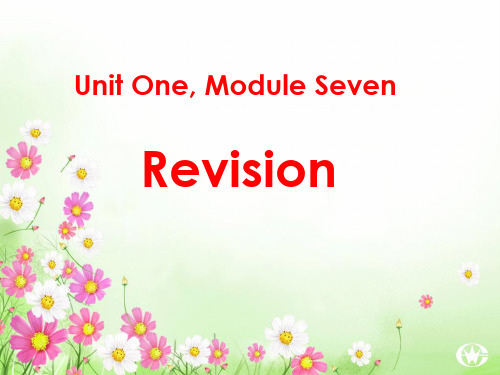
1.review(反义词) 2.consumer(动词) 3.assume(名词) 4.convenience(形容词) 5.weigh(名词) 6..advancement(动词) 7.necessarily(形容词) 8.caution(形容词) 9.expose(名词) 10.dedfinite(名词)
4. I forgot to have my watch ___w_o_u_n_d_(wind) last night.
5. These examples, once __a_d_d__e_d_(add) to his article, will make it sound more reasonable and acceptable.
3.震惊:Her performance electrified the aeuledcietrnocne.她n.【的c表】演电使子观:众a兴n e奋le不ct已ro。n microscope 电子显微镜 electronic 1.adj.电子的:an electronic engineer电子工程师 electronic organ 电子琴 electronics n. 【u】电子学
3. [C] 弹簧; 发条: a watch spring 表的发条 the springs in an armchair 单座沙发内的弹簧 [attrib 作定语] a spring-`mattress 弹簧床垫 Don't bounce on the bed you'll break the springs! 别在床上乱蹦--你要把弹簧弄断了!
全镇各处很快盖起了新房springsthonsb向某人突然说出或提出某事物令人惊奇或猝不及防springbadnewsonsbspringtolife突然活跃起来onhearinghisnamecalledthesleepingdog
牛津高中英语模块七第一单元单词讲解

10.spring 1. He turned off the alarm and sprang out of b 猛然跳起
2. He sprang his feet when he saw his mother =stood up suddenly
3. Tears sprang to her eyes突. 然出现/来到 4. Play areas for children ar迅e 速出现,突然兴起
1. The news will ~ his fans all over the world.
使高兴
2. 3.
He delights to She delighted
prove in her
his brother work.
w>ro喜因ng欢某. 做事
高兴
4. I’m delighted to receive your letter.
5. I was delighted at the thought of seeing you
6. I was delighted with my present.
7. I was delighted that you were all successful.
8. to one’s delight
9.The naughty took (a) delight in pulling
填写申请表
unch 1. ~ a campaign/an investigation/an attack 开始从事,发起,发动 2. ~ one’s latest novel / the new model of the mobile phone
发行,(首次)上市
3. ~ a new warship/a satellite
牛津高中英语模块7Unit1

A device that makes calculations, etc. with data represented as a series of digits.
A digital computer
A electrical appliance that takes up dust, dirt, etc. by suction. A vacuum cleaners
It’s a type of oven which cooks food very quickly using microwaves.
A microwave oven
A cabinet or room in which food is kept cold. A refrigerator
A electric machine for washing clothes. A washing machine
functionsone的复数形式为ones作替代词时只可替代同一类人或事物的复数名词其前面必须有限定词如thesomeall等修饰
牛津英语模块7
Unit one
江苏洪泽第二中学
刘殿海
It can be stationed on the wall. It can make our room warm in winter and cool in summer. An air-conditioner
Read what the manager says (Part A on page 6) and fill in the form. Electronic goods Audio devices: Educational products: MP3 players educational software CD players electronic dictionaries MP3 players electronic translators
牛津译林模块七第一单元语法(共36张PPT)
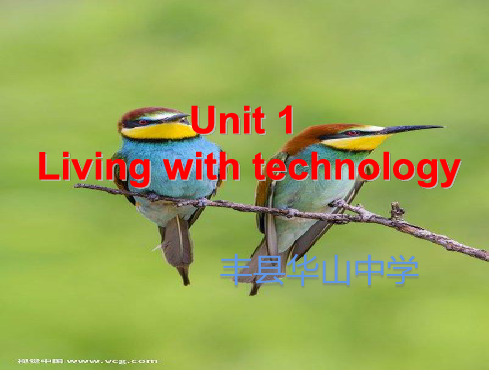
可以跟复合宾语的动词有两类: 1 感官动词:可以跟下列类型的补足语 1)不定式—表示宾语实施过行为 需要省略to 的常用的知觉动词有:feel,hear,listen to,see,watch,notice,observe,look at,如:
-- We saw him get on the bus.
丰县华山中学
我们在查词典的时候,经常会在一些动
词后面看到这样的词性:vi 和 vt,比如: vt / vi 实际上是缩写。 v 代表 verb,就是动词,而t 是单词-transitive(及物的) 的首字母, i是单词 intransitive(不及物)的首字母。
那么 vt 的意思就是“及物动词”;而 vi 的意思就是“不及物动词”。很多同学分 不清楚这两个概念。
2. “主+谓+间宾+直宾”结构。如:
Please hand me the book over there.
• 直接宾语是及物动词(hand)的直接对象, 也是这里hand这个“递给”的动作,给的是 书所以书就是直接宾语;
• 间接宾语是及物动词的动作所涉及的人或 事务,也可以说间接宾语表示动作是对谁 做的,或者是为谁做的。
We heard the song sang by the girl. ____________________________ We found the door broken. ______________________
使役动词:可以跟下列类型的补足语 1)不定式——表示宾语将要实施的行为 * 需要省略to的常用的使役动词有:let (让),make(迫使; 促使),have(使、让、 叫),bid(命令),如: -- I won’t let you try again
Unit 1 及物动词与不及物动词
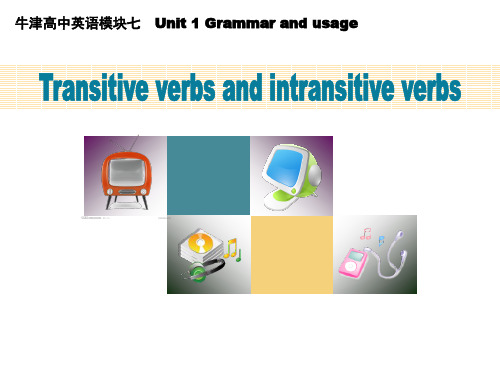
• Bored with life in the city, he moved to a remote village accessible only by boat. • Some intransitive verbs can be followed by a prepositional phrase.
search for search for to try to find an explanation or solution Scientists are still searching for a cure. She paused, searching for inspiration.
Word study
answer for
to explain to people in authority why you did something wrong or why something happened, and be punished if necessary Their coach must answer for the team's poor performance.
• By the late 1970s, video recorders small and cheap enough for home use were introduced. • Most transitive verbs can be used in the passive voice.
• Times sure have changed!
suffer from (pain) to experience physical or mental pain At least he died suddenly and didn't suffer. She's suffering a lot of pain. suffer from I'm suffering from a bad back. Mary's suffering from ill health at the moment.
牛津高中英语模块七Unit 1备课要点

牛津高中英语模块七Unit 1备课要点Word study1. review n. 回顾;综述;评论,评述a book review 书评a review of customer complaints 有关消费者种种不满的汇报vt. 复习; 回顾;检阅;评审(新书等),写评论review last week’s lessons 复习上周的功课review the past 回顾过去review the troops 检阅军队review a new novel 给一本新出版的小说写书评2. transmission n.(电视或电台)广播节目;播放;(疾病)传播a live transmission from Sydney 来自悉尼的现场直播the transmission of computer data 电脑数据传播the transmission of disease 疾病传播3. superior n. 上级;长辈;优越者;优胜者I am going to complain to your superiors. 我要向你的上级投诉.He has no superior in this respect. 在这方面没人能胜过他.adj. 上级的;(指数量)较大的, 优势的;胜过的a superior court 上级法院be superior in numbers 数量上占优势词组be superior to 胜过, 比……好This machine is superior in many respects to that.这台机器在很多方面比那台好.This model is technically superior to its competitors. 这一款式在技术上超过了与之竞争的产品。
4. wind (wound, wound)n. 风v. 蜿蜒,缠绕,转动,上发条wind one’s way 蜿蜒;曲折延伸wind up 给……上发条sail against the wind 逆风而行The snake wound its way to the hole. 这条蛇蜿蜒前行到洞中.wind the wool into a ball 把毛线绕成一团He forgot to wind (up) his watch. 他忘了给他的表上发条.5. electric adj. 电的electricity n. 电electronic adj. 电子的electrical adj. 与电有关的an electic fire/fan/light 电炉/扇/灯electrical engineering/faults 电机工程, 电器故障electronic music/mail/calculator/dictionary 电子音乐/邮件/计算器/词典6. apply vt&vi 申请;运用;专心致志于apply (to sb.) for sth. 向……申请……apply sth.to sth. 将…应用于…apply oneself to 专心于I want to apply for the job to the company. 我想向这个公司申请这项工作.Students should apply themselves to their study.学生们应该专心致志地学习.The new technology was applied to farming. 这种新技术被应用于农业.n. application 申请表fill in the application 填申请表7. launch v. 投放市场;发起,发动;发行;发射The new model will be launched in July. 新模型将在七月投放市场.launch a campaign to raise money 发起筹款活动launch a rocket / a satellite 发射火箭/卫星launch one’s latest novel / the new model of the mobile phone发行最新小说/新型号手机8. demand n. 需要,需求meet/satisfy one’s demand for sth 满足对…的需求make demands on 对…提出要求v. 要求demand an apology from sb.要求某人道歉He demanded that the right to vote (should) be given to every adult woman.他要求选举权给予每一位成年女性.He demanded to meet the general manager. 他要求见总经理.9. degree n. 程度; 度; 学位to a certain degree/to some degree在某种程度上Water freezes at 0°C.(zero degrees centigrade) 水在0℃结冰.I agree with you to a certain degree. 在某种程度上我赞同你的观点.She received a doctor’s degree. 他获得了博士学位.10.spring n.春天;泉水;弹簧;弹性;发条The rubber has lost its spring. 橡皮没有弹性了.The spring of my watch is broken. 我手表的发条坏了.a mineral spring 矿泉水vi.(sprang-sprung) 跳跃;弹起spring up突然出现,涌现,迅猛发展The cat crouched ready to spring. 猫弓起背准备跳.Amusement parks for children are springing up all over the world. 孩子们的游乐场如雨后春笋般在全世界涌现出来.11.delight n. 高兴,喜悦.to one’s delight让某人高兴的是take delight in 以…为乐The naughty boy took delight in pulling the dog’s tail. 这个调皮的男孩喜欢拽狗尾巴.v. 使…高兴All things delight us. 事事都让我们高兴.adj. delighted delightingI’m delighted to receive your letter.12.convenience n. 方便,便利at one’s convenience 在某人方便的时候Can you telephone me at your convenience to arrange a meeting ?adj. convenientif it is convenient to sb. 如果你方便的话(注意:不可用人做主语.)13.assume vt. 假设,认为It is generally assumed that 。
牛津译林版高中英语模块7:Unit1 Grammar and usage

需要注意的一点是:少数不及物动词 唯一可跟的宾语是同源宾语。 如:I dreamed a dream last night.
易误用作及物动词的9个不及物动词:
误:deal a problem 正:deal with a problem 处理问题 误:depend sb. 正:depend on sb. 依靠(依赖)某人 误:insist doing sth. 正:insist on doing sth. 坚持要做某事
既可以用作及物又可以用作不及物的动 词,其意义不变。 如begin 都是作“开始”讲。 Everybody, our game begins. Let us begin our game. 类似的还有:start, answer, sing, close, consider, insist, read, learn, prepare, pay, hurt, improve...
类似的还有:buy, catch, invent, found, like, observe, offer, prevent, promise, raise, find, forget, receive, regard, see, say, seat, supply, select, suppose, show, make, take, tell...
误:knock the door 正:knock on [at] the door 敲门 误:operate sb. 正:operate on sb. 为某人做手术 误:participate sth. 正:participate in sth. 参加某事 误:refer sth. 正:refer to sth. 查阅(参考)某物
不及物动词(vi. ):不及物动词后不能 直接跟有动作的对象(即宾语)。若要 跟宾语,必须先在其后加上某个介词。 如:look (看) 即不能直接加宾语
牛津高中英语模块七unit1
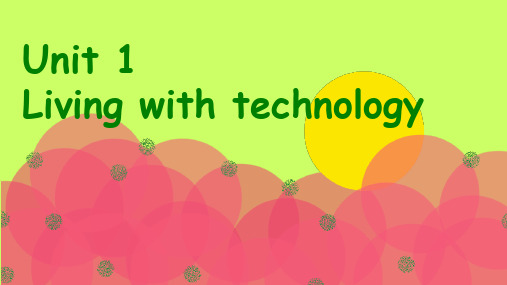
3. Delay:
v.(使)推迟,延迟
Regular colour TV broadcasts were delayed in
1.The percentage of the students is 46.
2.The percentage of the water is 46. b. 数词+percent+of+sth;这时后面谓语的单复数以percent后面跟的主语为 主,例如: 1.2 percent of the apples(这里是复数的可数名词) are(所以用复数) eaten. 2.2 percent of the apple(这里是单数,指的是一个苹果的一部分) is(用单数 ) eaten. 3.2 percent of the water(这里是不可数名词) is(单数) drunk.
8. Benefit from:得益于 If you have children, remember that they benefit from downtime during the week as well. 假如你有孩子,记得也要让他们从这周末的时间里感受到快 乐。
Benefit by (强调以某种方式) Chances are, no matter what type of business you are running or involved with, it would benefit by cold calling. 不管你经营的是何种类型或牵涉到何种类型的生意,陌生拜 访都会带来利益,这就是机会。
- 1、下载文档前请自行甄别文档内容的完整性,平台不提供额外的编辑、内容补充、找答案等附加服务。
- 2、"仅部分预览"的文档,不可在线预览部分如存在完整性等问题,可反馈申请退款(可完整预览的文档不适用该条件!)。
- 3、如文档侵犯您的权益,请联系客服反馈,我们会尽快为您处理(人工客服工作时间:9:00-18:30)。
及物动词和不及物动词英语中的实义动词,有及物动词(transitive verb)和不及物动词(intransitive verb)之分,缩写形式分别为vt.和vi. 。
一、及物动词及物动词是指后面可直接跟宾语,并且必须跟宾语才能使其意义完整的动词。
大部分及物动词有被动语态。
及物动词常用于以下三种结构中:(1)“主语+谓语+宾语”结构此时的宾语可以是一个名词、代词、不定式、动名词或者从句。
如:Mary enjoys music .(名词)He loves her.(代词)I want to get your help.(不定式短语)I don’t know what to do.(疑问词+不定式)The old man enjoys living in the countryside.(动名词短语)I don’t think that he’s right.(宾语从句)学法点拨:常接不定式作宾语的动词有:attempt, dare, decide, desire, expect, hope, intend, learn, need, offer, pretend, promise, refuse, want, wishi等。
可以接“疑问词+不定式”作宾语的动词有:ask, consider(考虑),decide, discover, explain, forget, guess, know, learn, remember, see, tell , think, understand, wonder等。
常接动名词作宾语的动词有:advise, avoid, ban , delay, enjoy, finish, imagine, mind , miss , practice, risk等。
接不定式和接动名词作宾语意义差别很大的动词有:forget, remember, regret, mean等。
(2)“主语+谓语+双宾语”结构该结构中的谓语动词必须跟两个宾语才能表达完整的意思。
一个是表示人的间接宾语,一个是表示物的直接宾语。
间接宾语一般在前面,直接宾语在后面。
如:Tom left Mary a message.有时直接宾语和间接宾语可以对调,此时间接宾语前应加上介词to或for。
主语+及物动词+物(直接宾语)+to+人(间接宾语)。
如:He offered a job to her.主语+及物动词+物(直接宾语)+for+人(间接宾语)。
如:Mother made a nice dress for the little girl.学法点拨:间接宾语前常用to的动词有:give, tell, lend , sell , teach, send , write, show, return, bring, pass, leave, offer, hand等。
间接宾语前加介词for的动词有:buy, choose, get, make, order, sing, do , save等。
(3)“主语+谓语+复合宾语”结构该结构中的动词虽然是及物动词,但是只跟宾语还不能表达完整的意思。
宾语和宾语补足语在“意义”上是一种主谓或动宾关系。
如:We elected Li Yang our monitor.(Li Yang is our monitor.)The news made us sad.(We were sad.)能充当宾语补足语的有名词、形容词、介词短语、动词不定式、分词等,用来补充说明宾语。
如:He appointed John marketing manager.(名词) The news made me happy.(形容词)I found myself in darkness.(介词短语) He encouraged her to work harder.(不定式短语) Don’t leave the water running after you have washed your hands. (分词)a.及物动词+宾语+形容词believe相信 find发现 get使 keep使保持 leave留下 make使 push推 consider认为declare宣布 imagine想象 judge判断 think认为We all believe him honest and kind.我们都相信他诚实、善良。
b.及物动词+宾语+名词call叫 name命名 make使成为 wish祝愿 consider认为 keep使 choose选择 elect选举We consider him a strange person.我们认为他是一个奇怪的人。
c.及物动词+宾语+带to的不定式advise建议 allow允许 ask要求 expect期望 invite邀请 get使 order命令 tell告诉teach教wish希望 warn警告 want想要Mother often tells me to make friends carefully.妈妈经常告诫我交朋友要慎重。
d.及物动词+宾语+to be+名词/形容词believe认为 consider认为 feel感觉 find发现 imagine想象 know知道 suppose猜测understand理解 prove 证明 declare宣布注意:这些结构中的to be可能省略,也就是说,这种结构相当于“及物动词+宾语+名词/形容词”。
e.及物动词+宾语+不带to的不定式have使 make使 let让 see看见 notice注意 feel感觉 watch观看 look at看 listen to 听 observe观察 discover发现 hear听见注意:这类动词(词组)在变被动语态时不能省略to。
They are made to work all day long.f.及物动词+宾语+现在分词see看见 hear听见 keep使 catch抓住 find发现 have让 watch观察 smell闻到 look at 看 observe观察 discover发现 get使Can you hear someone playing the piano next door?你能听见隔壁有人在弹钢琴吗?g.及物动词+宾语+过去分词have使 get使 make使 find发现 feel感觉 see看见 hear听见 think认为 watch观看I couldn’t make myself heard by all the listeners. 我不能使所有听众都听见我说话。
h.及物动词+宾语+of sth.accuse控告 cheat欺骗 cure治愈 inform通知 remind提醒 rid摆脱 rob抢劫 warn警告The song reminds me of my school days.这首歌让我想起了我的学生时代。
i.及物动词+宾语+for doing sth.blame 指责 criticise批评 forgive原谅 excuse原谅 pardon原谅 punish惩罚 scold指责thank感谢Forgive me for saying so. I didn’t mean to hurt you.请原谅我这样说,我并不是故意伤害你的。
j.及物动词+宾语+as/for等引起的介词短语regard看作 consider认为 choose选择 use用 keep保持,保留You can keep this book as your own.你可以留着这本书。
学法点拨:有时作宾语的不定式、动名词。
宾语从句跟一个补足语时,为保持句子结构平衡,避免句式结构混乱,要用it作形式宾语,而将真正的宾语放在句尾,构成“主语+谓语+it+宾补+真正宾语”结构。
如:I found it very pleasant to be with your family.二、不及物动词不及物动词后面不可以直接跟宾语,但可以接副词、不定式、介词短语、状语从句等作状语。
不及物动词没有被动语态。
The machine works smoothly.(副词) They stopped to take a short rest.(不定式短语) He is standing by the window. (介词短语)不及物动词如果要接宾语,必须加介词或副词。
这些加了介词的不及物动词,很多有固定的意思。
如:The boy looked up very word he came across while reading.这类结构常见的有:appeal to, associate with, belong to, bow to, care for, complain of , consist of , contribute to , depend on, end with, listen to , long for, object to, refer to, relate to, result in , suffer from, think of, wait for等。
Ⅰ.单项选择1.The workers the glasses and marked on each box“This Side Up”.A.carriedB. deliveredC. pressedD. packed2.If she doesn’t want to go, nothing you can say will her.A.persuadeB. promiseC. inviteD. support3.The teachers in the city demanded that their pay close to the level of civil servants.A.be raisedB. would raiseC. would riseD. should be risen4.As the story , the truth about the strange figure is slowly discovered.A.beginsB. happensC. endsD. develops5.The president hopes that the people will be better off when he quits than when he .A. has startedB. startsC. startedD. will start6. The new movie to be one of the biggest money-makers of all time.A. promisesB. agreesC. pretendsD. declines7. William found it increasingly difficult to read, for his eyesight was beginning to .A. disappearB. fallC. failD. damage8. Mary, I John of his promise to help you.A. toldB. remindedC. warnedD. advised9. I a bank account after I made $1,000 by doing a part-time job during the summer vacation.A. borrowedB. openedC. enteredD. ordered10. –Are you still mad at her?--Not really, but I can’t that her remarks hurt me.A. denyB. refuseC. rejectD. decline11. I’d prefer to my judgement until I find all the evidence.A. showB. expressC. passD. reserveⅡ. 用适当的动词或动词短语完成下列句子。
